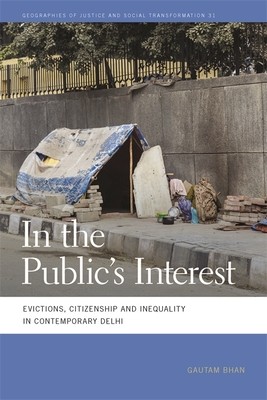
- We will send in 10–14 business days.
- Author: Gautam Bhan
- Publisher: University of Georgia Press
- ISBN-10: 0820350095
- ISBN-13: 9780820350097
- Format: 15.2 x 22.9 x 2.1 cm, hardcover
- Language: English
- SAVE -10% with code: EXTRA
Reviews
Description
This book studies the recent legacy of basti "evictions" in Delhi--mass clearings of some of the city's poorest neighborhoods--as a way to understand how the urban poor are disenfranchised in the name of "public interest" and, in the case of Delhi, by the very courts meant to empower and protect them. Studying bastes, says Gautam Bhan, provokes six clear lines of inquiry applicable to studies of urbanism across the global south.
The first is the long-standing debate over urban informality and illegality: the debate's impact on conceptions and practices of urban planning, the production of space, and the regulation of value. The second is a set of debates on "good governance," read through their intersections with ideas of "planned development" within rapidly transforming cities. The third is the political field of urban citizenship and the possibilities of substantive rights and belonging in the city. The fourth is resistance and the ability of a city's subaltern residents to struggle against exclusion. The two remaining inquiries both cut across and unify the first four. One of these is the role of the judiciary and the relationships between law and urbanism in cities of the global south. The other is the relationship between democracy and inequality in the city. What emerges about Delhi in particular are a set of new modes for the reproduction of inequality. When rights are lost, citizenship is unequal and differentiated, the promise of development is refused, and poverty and inequality are reproduced and deepened. The task at hand, says Bhan, is not just to explain evictions but also to listen to what they are telling us about "the city that is as well as the city that can be."EXTRA 10 % discount with code: EXTRA
The promotion ends in 15d.23:52:27
The discount code is valid when purchasing from 10 €. Discounts do not stack.
- Author: Gautam Bhan
- Publisher: University of Georgia Press
- ISBN-10: 0820350095
- ISBN-13: 9780820350097
- Format: 15.2 x 22.9 x 2.1 cm, hardcover
- Language: English English
This book studies the recent legacy of basti "evictions" in Delhi--mass clearings of some of the city's poorest neighborhoods--as a way to understand how the urban poor are disenfranchised in the name of "public interest" and, in the case of Delhi, by the very courts meant to empower and protect them. Studying bastes, says Gautam Bhan, provokes six clear lines of inquiry applicable to studies of urbanism across the global south.
The first is the long-standing debate over urban informality and illegality: the debate's impact on conceptions and practices of urban planning, the production of space, and the regulation of value. The second is a set of debates on "good governance," read through their intersections with ideas of "planned development" within rapidly transforming cities. The third is the political field of urban citizenship and the possibilities of substantive rights and belonging in the city. The fourth is resistance and the ability of a city's subaltern residents to struggle against exclusion. The two remaining inquiries both cut across and unify the first four. One of these is the role of the judiciary and the relationships between law and urbanism in cities of the global south. The other is the relationship between democracy and inequality in the city. What emerges about Delhi in particular are a set of new modes for the reproduction of inequality. When rights are lost, citizenship is unequal and differentiated, the promise of development is refused, and poverty and inequality are reproduced and deepened. The task at hand, says Bhan, is not just to explain evictions but also to listen to what they are telling us about "the city that is as well as the city that can be."

Reviews